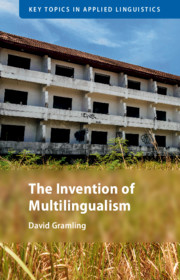Book contents
- The Invention of Multilingualism
- Key Topics In Applied Linguistics
- The Invention of Multilingualism
- Copyright page
- Dedication
- Contents
- Figures
- Preface
- Acknowledgments
- Introduction
- 1 Right-Sizing Multilingualism
- 2 The Problem of Value
- 3 Justice and Injustice
- 4 Hospicing Late Mono/lingualism
- Epilogue The Multilingual Undercommons
- Glossary
- References
- Index
3 - Justice and Injustice
Published online by Cambridge University Press: 04 June 2021
- The Invention of Multilingualism
- Key Topics In Applied Linguistics
- The Invention of Multilingualism
- Copyright page
- Dedication
- Contents
- Figures
- Preface
- Acknowledgments
- Introduction
- 1 Right-Sizing Multilingualism
- 2 The Problem of Value
- 3 Justice and Injustice
- 4 Hospicing Late Mono/lingualism
- Epilogue The Multilingual Undercommons
- Glossary
- References
- Index
Summary
Chapter 3 addresses, agnostically at first, whether multilingualism is itself necessarily just, turning to key examples in which multilingualism is put to use in capacitating and promoting justice. Examples from European Union law, UK asylum law, and US American criminal and civil case law offer concrete and contradictory evidence. This chapter further engages with the question of decolonial justice as distinct from poststructuralism, queering, disinvention, deconstruction, and various other frameworks frequently applied in thinking about the relations between justice and language. What does the decolonial option reveal about ongoing and emerging debates about multilingualism, and what can those debates, in turn, reveal about the variously divergent discourses of decolonial thought?
- Type
- Chapter
- Information
- The Invention of Multilingualism , pp. 121 - 159Publisher: Cambridge University PressPrint publication year: 2021

